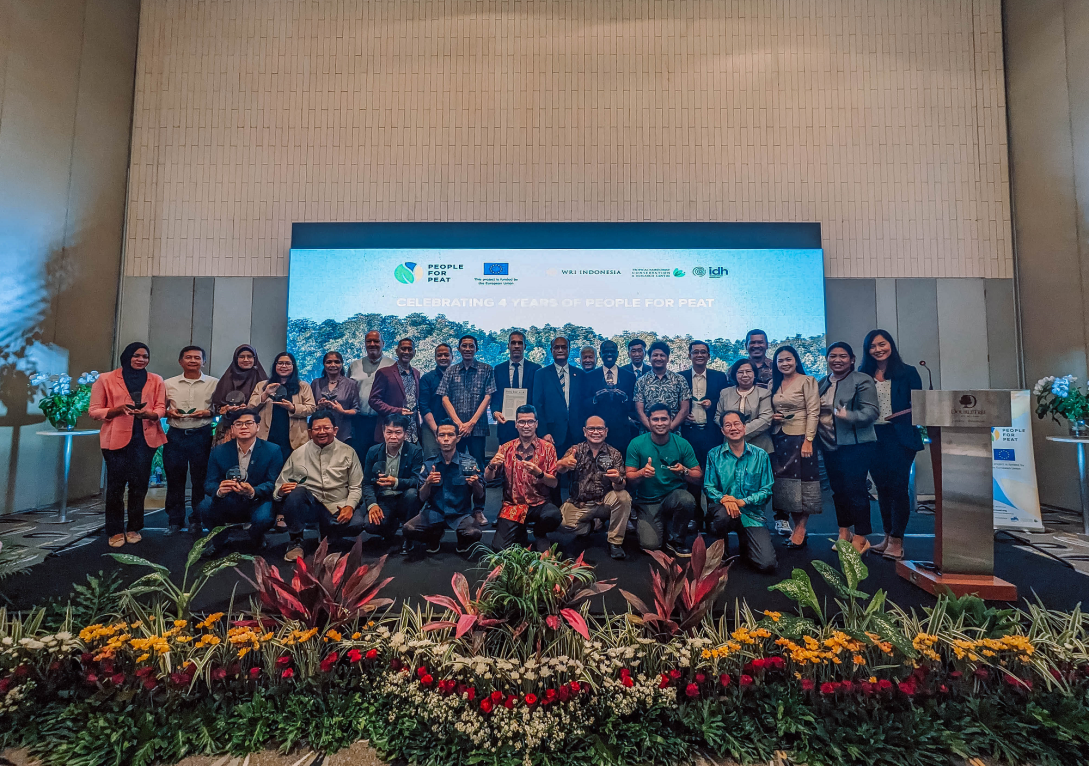Celebrating the People for Peat Project: A Milestone in Sustainable Peatland Management and Collaboration in Southeast Asia

Celebrating the People for Peat Project: A Milestone in Sustainable Peatland Management and Collaboration in Southeast Asia
The Delegation of the European Union (EU) to ASEAN celebrated the successful completion of a four-year EU-funded project implemented by the People for Peat (PFP) coalition with a closing ceremony and networking event in Central Jakarta today (11/4). This ground-breaking initiative has facilitated collaboration, research, and sustainable peatland management throughout Southeast Asia.
Peatlands are critical in combating climate change, as they store vast amounts of carbon. In response to the need for sustainable peatland management and peat fire prevention, the EU-funded Sustainable Use of Peatland and Haze Mitigation in ASEAN Component 2 (SUPA C2) project aimed to fill the knowledge and information gap about peatlands in the region.
The PFP coalition, consisting of the World Resources Institute (WRI) Indonesia, the Tropical Rainforest Conservation & Research Centre (TRCRC), and the Yayasan Inisiatif Dagang Hijau (IDH), implemented the SUPA C2 project through three main pillars: Research, Business and Investment, and Outreach and Advocacy.
“I extend my deepest gratitude to everyone who has contributed to this project, particularly the local communities that welcomed us into their lives," said Thibaut Portevin, Head of Cooperation of the EU Delegation to ASEAN, in his opening remarks. "Your dedication, hard work, and passion have made a lasting impact on peatland management and conservation. Let us continue building upon the foundation laid by the SUPA Component 2 project, working toward a future where peatlands are recognised, valued, and managed sustainably for the benefit of all,” he added.
Nirarta Samadhi, Country Director of WRI Indonesia, highlighted the significance of sustained efforts to promote sustainable peatland use in ASEAN and introduced peopleforpeat.org. This online platform has been designed to disseminate knowledge and best practices on sustainable peatland management in Southeast Asia.
The recent Peatland Science Dialogue in Ho Chi Minh City, Vietnam, underscored the significance of research in sustainable peatland management and haze mitigation. The event united scientific communities, non-state actors, and stakeholders from eight targeted countries in the region.
During the dialogue, researchers shared findings and explored ways to support policies with science-based knowledge for peat fire prevention and sustainable peatland management. The recommendations generated will contribute to the ASEAN Peatland Management Strategy (APMS) and serve as valuable resources for policymakers and regulators.
Over four years, the PFP coalition has also assisted 16 peat-related businesses across the region in scaling their initiatives through the PFP Business Hub, a business accelerator focusing on enhancing sustainability across three dimensions: environmental protection, economic productivity, and social inclusion.
Despite the global pandemic, PFP successfully transitioned to online engagements, hosting virtual symposiums, interactive workshops, and two popular photo contests. PFP built connections and fostered relationships with local partners and experts, which enabled the successful execution of the Peat Ranger Training Programme and subsequent Peat Ranger Deployment when regional travel resumed.
The Peatland Tales video series captures the inspiring stories of community leaders who have dedicated themselves to preserving and protecting peatlands for future generations.
As the PFP-led project concludes, today's event presented final project recommendations and a policy brief on sustainable peatland management, which will serve as a blueprint for future efforts in the region, particularly for non-state actors.
Moving forward, the PFP-led project encourages ongoing information and data provision on peatlands, expanded coverage of the ASEAN Haze Portal, continuous dialogue between state and non-state actors, and the evolution of the PFP coalition to explore new funding sources and innovative ideas for peatland conservation.
CONTACT DETAILS
More info: https://peopleforpeat.org
